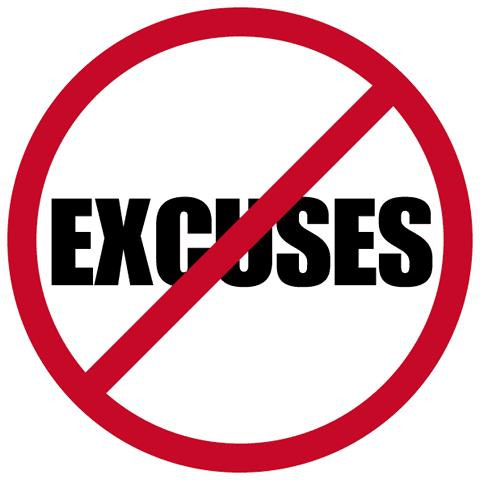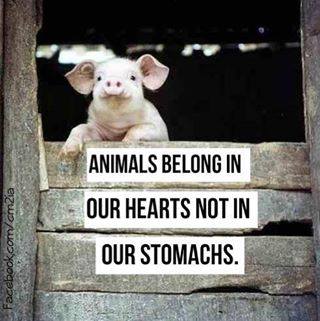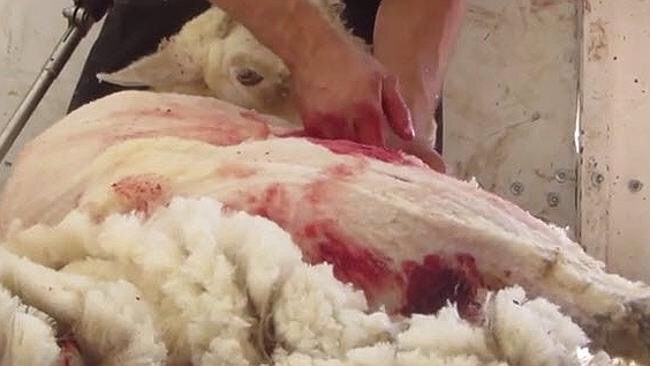Every day we are faced with articles opposing the message of Veganism and it usually all comes down to the same, they are not based on facts nor are they logical. Here a most recent article tackling the issue with a PETA campaign “
PETA’s shock and awe anti-wool campaign is offensive to the public and farmers”
First I want to make clear, I am neither a peta member nor have I ever been. I have known about peta for years and was often faced with their gory pictures which I got upset about when people shared them, they were popping up on my newsfeed, but they got me thinking, I started investigating and ultimately they led me to the truth. The real story behind animal agriculture is so successfully hidden behind many add campaigns by the food industry, in particular meat, dairy and eggs. Therefore to demonize peta for using a “prop” to get a message across is nothing different than the large multi billion dollar corporations brainwashing our society everywhere, just think about it, radio, tv, billboards, movie theatre, magazines, fashion, school, you name it, it’s endless, yet little peta in the mix of giants has such an impact. Must hit some kind of a nerve.
Let’s assess the “fake” sheep. Just like you wouldn’t take a woman and child, beat them up for real and take a picture to advertise for domestic abuse, it would be completely immoral and unethical if an animal rights organization took a real animal, abused it and made a picture. So Peta is being called out for using a prop?
Let’s get to this article and how fallacious and illogical it is:
Just because someone was a “vegan” for 20 years, makes absolutely no sense that that person represents a complete philosophy. First off nobody who is an ethical vegan considers themselves holier, superior or more spiritual evolved, but has evaluated all aspects of animal exploitation, health, nutrition, ethics, environment, world hunger, oppression etc and has come to the clear headed solution that if it is possible to minimize ones own impact on negative outcomes, why would one chose not to?
If someone considers a “plant based diet” (and I am deliberately not using the term “vegan diet” since plant based is a diet, vegan isn’t) to be difficult, they are clearly making it all about themselves, and not the victims or the facts that surround a vegan philosophical way of living. If it is a pain for a waitress, family or friends that you chose to live compassionately and minimize harm, you should reevaluate your life and the people surrounding you. I have not once ever encountered any problems except questions which I had factual answers for. This person seems to have been on a plant based diet for many other physiological or psychological reasons, yet never for an ethical vegan stance. It is clear that this person is going back to that one point in their life, before google was available and now trying to profit by writing a anti vegan propaganda piece, just to make some point that is completely irrelevant to our situation today.
If a naturopath says to a person “you are starving” it is clearly not due to a failed plant based diet, but a fail in knowing how to properly nourish one self, be it on any kind of diet. If someone fails to eat properly due to whatever reasons, drug addictions, eating disorders, stress, depression, mental illnesses etc why would “veganism” become it’s target? It makes absolutely no sense.
It is clear in this article that it is set up to bash a movement that stands for non violence and to minimize ones own negative impact on our earth, the animals, our health and humanity. Yet to use words as “convert” implies that vegan (in this case a diet) needs converting as in a religion. Yet vegans don’t worship an invisible person, an old story book or have any man made guidelines they follow except logic, facts, science, non-violence and to minimize ones own negative impacts.
Nobody needs meat, but everybody needs nutrition, where you get it from is not as important as long as u get them, some nutrients can be absorbed better from different foods and in certain combinations, yet the claim that one person needs a decaying corpse for food, is completely false. Like all living beings we thrive if our bodies have the proper balanced nutrients and our major civilization illnesses and diseases are due to the lack in so many nutrients, yet the majority eats animal products, what does that show you?
Appeal to Nature fallacy is simply another excuse to continue in the endless vicious cycle of animal exploitation. It is a very common choice when one wants to justify their own actions by using “nature” or a wild animal as an excuse. Yet for nothing else in life would they use that excuse. There is a big difference between killing out of instincts for survival or for pure palate pleasure & convenience. Nature’s “cruelty”, better said it’s balance and circle to survive, needs no human interaction, animals and this world can live perfectly without human beings, yet we cannot live without nature or animals. Therefore it makes us quite insignificant and if we consider ourselves all that great, who has the superiority complex? If we continue to destroy this planet, exploit and abuse animals, humans and our own bodies, we will not secure a future on this planet for the human race.
All farming practices to maximize financial gain or for palate pleasure is cruel. It involves standard acceptable business practices, if performed on a companion animal, you would be punished by law. Farm animals feel no different than domesticated animals, they experience pain, suffer and all want to live and not die. We have created a mass killing machinery that has overbred these innocent beings to yield maximum profit, they are overbred, bred to the max, used, fattened, confined and held in the most tight quarters for maximum profit and then hauled to a disgusting mass slaughter factory. Nothing “natural” about the way we farm animals. Are we comparing nature now because it doesn’t suit our point? Even small scale so called “humane” farmers, still perform mutilations and kill animals way before their natural times, only for palate pleasure. The animals still use up endless resources and create unnecessary waste only for a few minutes of culinary pleasure.
To use the term “nothing is perfect” as an argument is a weak point and clearly shows the author has no real facts nor credibility. If we applied that logic, we should say, hey this world isn’t perfect, we still have people that are bad, so I can easily support anything that involves war, torture, rape, killing, injustice etc. As soon as you are educated and aware of how your actions and choices affect other living beings and you continue to support that, you are just at fault as the person committing the crime. To excuse that by “nobody is perfect” or “there is always the bad ones” is not taking responsibility for your own actions which is very cowardly. Do we live in a perfect utopian world? No, does that mean we should not strive to be better? Of course not. If you want to stay comfortable and selfish you don’t care, but anybody writing an article or saying they care pointing their finger at people trying to fight for justice, is a complete hypocrite.
Just like broiler chickens are overbred and their bodies grow so rapidly and large that they suffer immensely, they can barely carry their unnatural weight on their feet, this is exactly what happens with our sheep. these sheep have been bred to yield max wool, and really could not live without being sheared. Even rescue sheep need to be sheared, does this mean that using wool is ok? No, because the whole breeding for human greed is wrong. The wool industry is toxic and to say that people use cotton and synthetics that are full of toxins/chemicals, disregards the complete abuse, exploitation and environmental impact of wool. Not only are the animals bred, mutilated (moulesing), exploited and killed, they are also sprayed with chemicals and have to bathe in toxic chemical baths and after shorn the wool is also processed, died etc until it is ready to be made into a consumer product. These animals also need food and water, and the keep, transport, slaughter etc needs immense amount of water, food and resources. If you grow cotton you of course use a lot of water and pesticides, but to place wool into the “green” zone is completely wrong and false. There are endless amounts of natural fibres humans could and can use, why is wool so popular? Because the wool industry is just as evil and big as the meat/dairy/egg industry exploiting innocent sentient beings for money. Yet fibres such as hemp, bamboo, nettle, coconut, pineapple, birch (viscose), cactus, are all options. Even making fabrics out of byproducts, such as recycling hulls from pineapple. Why isn’t it done on a large affordable basis, because we are so brainwashed by the wool industry! Wool is neither ethical, sustainable or environmentally friendly.
To say “yes some sheep are nicked, it’s like a man shaving”, is a huge understatement and false comparison. Last time I checked a man shaved himself by his own will. He is not forcefully held down and sheared all over his body in maximum speed for money. To compare something like that just shows the disregard to animals.
Now on to the attacks towards caring and compassionate people speaking out about injustice, it is called freedom of speech and has been the only hope in history of change, or else we may still have child labor, no women rights, slavery and holocausts. While some of that may still happen around the world and is to this date a tragedy and also needs speaking out, it happens on a daily basis all around the world to the most innocent living beings, our “food animals”, which are exploited and killed not out of necessity but culinary pleasure. If you can avoid being a part of any oppression or exploitation, be it for human or non-human animals, why wouldn’t you?
It is not about animal welfare but animal rights, the basic rights to live free of human exploitation which means no breeding for human gluttony.
The article is all based on fallacious arguments such as “since something is always going to be bad or harmful” screw it, I will just accept that and not take any responsibilities of my own actions. There is no humane killing when it comes to greed or palate pleasure. To put a suffering animal out of it’s misery (even humans) is not the same as killing for fun. If vegans are hypocrites, I would like to know what omnivores are that claim to love and respect animals yet eat them. Who says that animals should be “food” if we were so hardwired to eat meat, every cat, dog, bird etc we looked at we would make us salivate. We are not in survival situations and if we were we would not be discussing this here. Therefore to consider any animal product for human consumption/use is completely arbitrary.
To compare the 56 billion unnecessary deaths per year with smartphones, computers, synthetics, plastics is again a very weak argument. Should we all reduce our impact on materialistic items? Of course, every purchase we make has an impact. Two wrongs don’t make a right. Just because you buy plastic that should last you a very long time, does not give you the equal right to devour a corpse 3 times a day or ever out of fun, pleasure or convenience. Minimization is the key in an ethical vegan philosophical way of life. Yes it may take a bit of commitment and self responsibility and a sense of community, oneness and compassion for humanity and animals, if you just don’t care you may not, but it’s not as extreme or difficult as they all paint it, all you do is open and broaden your knowledge and start to pay attention to facts, details and information. If you feel that it is limiting, you may be caught in the circle of consumerism, if you think you are making a free choice you have not considered the daily influences these large corporations have on you, our society and status quo. It is much more liberating and free to live as ethically as possible because then really YOU are making the decisions!
If the author of the original article or other people think ethical vegans are cruel, is because they are faced with the truth and realities of their own actions that vegans point out. Nobody ever wants to face that what they may be doing causes discomfort, pain, suffering, heartbreak for others, so it’s easier to blame the messenger instead of taking responsibility for ones own actions. It may be considered a “lifestyle choice”, but the choice non-vegans make is to involve victims and disregard that all together because of their selfish needs. Yes humans are animals too, that is the exact point.
If the author thinks there is a conscious way to eat meat, there is a conscious way to eat all together, which means your conscious should know that devouring a corpse for fun is wrong. The only “conscious” eating would be a plant based diet with a vegan philosophical way of life. Being older and wiser in the sense of knowing what a body needs, does not mean a plant based diet is not healthy. We can eat consciously and from local farmers all while staying true to a plant based diet. No life has been “given” by an animal, it has been violently taken, and to fill your freezer with corpses sounds more like a morgue than a fridge that should feed your life with healthful food. Wearing wool is wearing literally a concoctions of chemicals and figuratively the blood of innocent victims on your body. Use a natural fibre and if synthetic, chose wisely. Many man made fibres nowadays have less impact on the environment than for example leather or wool. It is 2015 and the world is moving away from cruelty and high intensive, resource wasting materials.
For the record, nobody is, as an individual, a reference to an entire industry or mass marketed cruelty products. To harvest honey on the scale we do, is cruel and wrong. Plenty of honey alternatives! Nothing is better than buying local and growing your own food, if possible fair trade and organic, to make soups, stocks, freeze fruits and veggies from the summer to last you for the winter, have plenty of nuts, seeds, grains and legumes and cook up a variety of amazing plant based dishes that not only nourish the body but also the conscience! No need to kill, it’s time to reevaluate all the choices that have been indoctrinated into our upbringings that just simply do not make sense or are sustainable, ethical or healthy!










